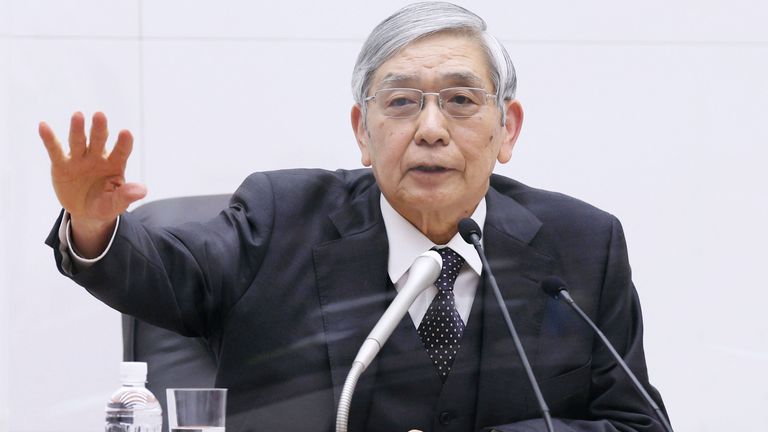The Bank of England was forced to ride to the rescue and, amid the punishment beating administered by the markets, the government was forced to unwind most of Mr Kwarteng’s initiatives.
Received wisdom in the markets was that the UK was the optimum size for the so-called ‘bond vigilantes’ to take on.
The US Treasury and the European Central Bank (ECB) were previously too big to take on, it was assumed, as was the Bank of Japan (BoJ).
That latter assumption is now being challenged. It appears that the bond vigilantes – who hold governments and central banks to account by selling their bonds and, in the process, pushing up borrowing costs – have saddled up again.
In their sights, remarkably, is the BoJ.
Last year, when the likes of the US Federal Reserve, the ECB, the Bank of England and others were busily raising interest rates, the BoJ was sticking with its ultra-loose monetary policy. The BoJ’s main policy rate remains at the -0.1{bb67dc8068aeb19f357bd521b023405218769edfdf2fbe8fd5046748dc5a5bcb} to which it was cut in February 2016.
Nor, unlike the likes of the Fed and the Bank of England, has the BoJ sought to unwind the emergency asset purchases – Quantitative Easing (QE) in the jargon – made during the last decade to stimulate economic activity.
javascript:”<html><head><script src=’https://securepubads.g.doubleclick.net/tag/js/gpt.js’ async></script></head><body><div id=’proper-ad-skynews_signal_300x250_1′></div></body></html>”
Advertisement

However, once it owned more than half the bonds issued by the Japanese government, the BoJ realised it was approaching the limits of what QE could do so it embarked on something called ‘yield curve control’.
This saw it set targets on where the yield (an implied borrowing cost) would be on Japanese government bonds of various durations. The idea was to try to depress short term interest rates – making life easier for households and businesses borrowing in the short term – while trying to keep the yield on longer-dated Japanese government bonds higher in order that the pension funds and life companies that buy them would not suffer too heavy a hit on their investment returns.
Late last year, though, the BoJ shocked markets by tweaking yield curve control in a way that was taken as a signal that it was moving in the direction of tightening monetary policy.
On 20 December, with investors winding down ahead of Christmas, the bank raised the cap on 10-year Japanese government bonds from 0.25{bb67dc8068aeb19f357bd521b023405218769edfdf2fbe8fd5046748dc5a5bcb} to 0.5{bb67dc8068aeb19f357bd521b023405218769edfdf2fbe8fd5046748dc5a5bcb}. The rationale was that the BoJ could be seen as moving back towards what might be called a normal interest rate policy but without actually raising interest rates.
But it has emboldened the bond market to take on the BoJ.
Traders aggressively sold 10-year Japanese government bonds and, on Friday, the yield (which rises as the price falls) jumped above the cap to 0.545{bb67dc8068aeb19f357bd521b023405218769edfdf2fbe8fd5046748dc5a5bcb} at one point. It forced the BoJ to embark on an emergency round of bond-buying – some 1.8 trillion yen (£11.4bn) in total as it sought to get the yield back down to 0.5{bb67dc8068aeb19f357bd521b023405218769edfdf2fbe8fd5046748dc5a5bcb}. The BoJ has been in the market again on Monday after the yield again briefly rose about the cap.
There are a number of conclusions to draw from this episode. The first is that the BoJ has been shown it cannot act in isolation from other central banks around the world. It cannot pursue an ultra-loose monetary policy at a time when all of the world’s other central banks are raising interest rates.
The second – as noted by Leo Lewis, the excellent Asia business editor at the Financial Times – is that finally someone has made money out of short-selling (selling a security you do not own in the hope of profiting from a fall in the price) Japanese government bonds.
For much of the last 20 years or more, shorting Japanese government bonds has been described by market professionals as the ‘widow maker’ trade, since most speculators who tried it lost their shirts. The experience of last Friday suggests there may, finally, be money to be made from doing so.
This may all sound fairly esoteric stuff only of interest to the bond markets.
It is, though, much more important than that. The events of September last year highlighted to the British public what can happen when the markets lose confidence in the economic policy of a government.
Japan has in many ways been a pioneer in whose footsteps others have followed. The BoJ had been making asset purchases for many years before the likes of the Fed, the Bank of England and the ECB embarked on QE.
And because Japan’s government had not been punished by the markets for its borrowing – Tokyo’s debt to GDP ratio is north of 260{bb67dc8068aeb19f357bd521b023405218769edfdf2fbe8fd5046748dc5a5bcb}, compared with 124{bb67dc8068aeb19f357bd521b023405218769edfdf2fbe8fd5046748dc5a5bcb} for the US, 112{bb67dc8068aeb19f357bd521b023405218769edfdf2fbe8fd5046748dc5a5bcb} for France; 99{bb67dc8068aeb19f357bd521b023405218769edfdf2fbe8fd5046748dc5a5bcb} for the UK and 67{bb67dc8068aeb19f357bd521b023405218769edfdf2fbe8fd5046748dc5a5bcb} for Germany – other governments may have been tempted to assume they could try and inflate away some of their debts painlessly.
The Truss administration’s policy of letting borrowing rip to pay for unfunded tax cuts was, up to a point, informed by what had happened in Japan.
Yet, even by the time of Mr Kwarteng’s mini-budget, the Japanese system was being stretched to the limit.
The BoJ owns so much of some maturities of Japanese government debt that, on some days last year, there was – astonishingly – no trading in some bonds.
So the biggest and most important conclusion is this. The bond vigilantes have now achieved a victory of sorts over an adversary, the BoJ, once considered too big to take on.
It is a message that will be heeded by every central bank around the world as they are urged by households, businesses and politicians to keep interest rate rises to a minimum.

